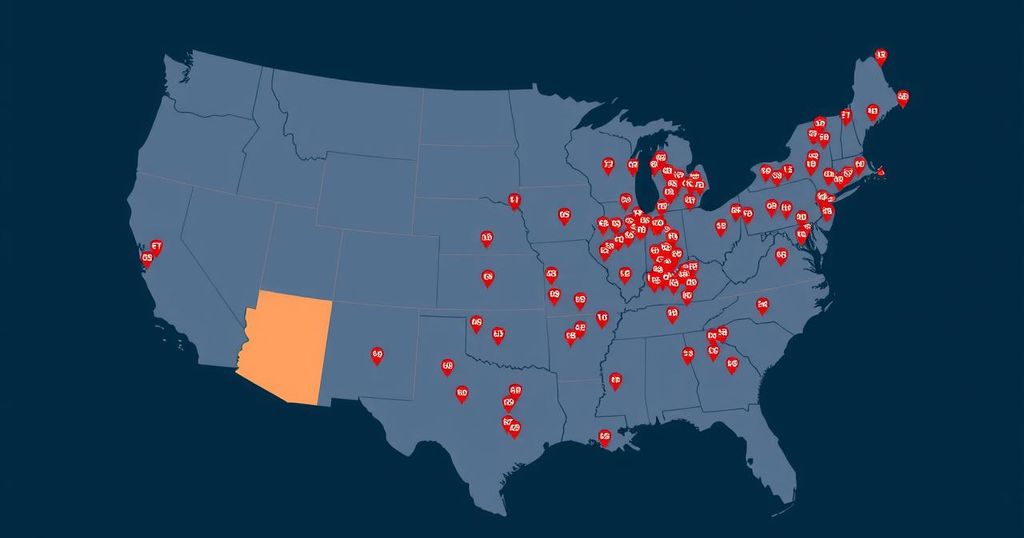World news
- SPIELVOGEL, AFRICA, AFRICAN NATIONAL CONGRESS, ASIA, COMMERCE DEPARTMENT, CONSERVATIVE PARTY, DEMOCRATS, DIA, DONALD TRUMP, ECONOMICS, ELECTION, EMMANUEL MACRON, EUROPE, GERMANY, GROVER CLEVELAND, INFLATION, JAPAN, KAMAL, KAMALA HARRIS, POLITICS, PRESIDENTIAL ELECTION 2024, SOUTH AFRICA, TRUMP, U. S
Daniel O'Connor
0 Comments
Election 2024: Will the United States Follow or Buck the Anti-Incumbent Trend?
The 2024 U.S. election is marked by a global trend of anti-incumbency, with Vice President Kamala Harris attempting to overcome voter dissatisfaction and a strong Republican challenge from Donald Trump. While the U.S. economy shows favorable indicators, public sentiment remains skeptical. As the election approaches, uncertainty prevails, with potential for close outcomes prompting concerns over vote counting and foreign influence. Candidates present contrasting visions, yet domestic issues are likely to dominate voter concerns.
As the United States prepares for the contentious electoral battle of 2024, the prevailing question arises: will incumbent Vice President Kamala Harris manage to withstand the global anti-incumbent trend evident in recent elections, or will she succumb to the mounting pressure of voter dissatisfaction? This year has not been favorable for incumbents globally, with significant electoral defeats noted across various nations. For instance, the Conservative Party in the United Kingdom faced a notable defeat, while the African National Congress lost its parliamentary majority in South Africa—a historic first. Additionally, Japan’s Liberal Democratic Party faltered in recent electoral challenges, and elections in Germany yielded disappointing results for the ruling coalition. France’s President Emmanuel Macron also faced backlash after calling for premature parliamentary elections. Despite these global trends, Harris might initially appear positioned to break the anti-incumbent pattern. The U.S. economy is reportedly performing well, with recent data indicating a GDP growth of 2.8 percent in the last quarter, coupled with low unemployment rates and a record high stock market, as noted in a recent Wall Street Journal article. However, public sentiment diverges from these statistics; a substantial portion of the American electorate perceives the economy unfavorably, expressing dissatisfaction with the country’s direction. As the election approaches, uncertainty looms over the potential outcomes. Historical polling inaccuracies during the past two elections provide a backdrop for cautious optimism among Democrats, who recall how projections underestimated support for their candidates in 2022. Simultaneously, Republicans are bolstered by the notion that a tight race favors their leading candidate, Donald Trump, as undecided voters tend to lean towards challengers in the final stretch. This unpredictable environment leaves open the possibility of varied outcomes in the battleground states, potentially leading to a decisive Electoral College win for either candidate or a scenario necessitating recounts and legal disputes reminiscent of the divisive 2020 election. The current political landscape remains volatile, with various external factors threatening electoral integrity, including foreign interference and misinformation campaigns. A Supreme Court ruling recently allowed Virginia to purge noncitizen names from its voter rolls, intensifying concerns about voter suppression as the election draws near. In their final campaign messages, Harris and Trump delineated stark contrasts in their visions for America. Harris emphasized a need to resist what she termed Trump’s dangerous ambition for power, while Trump promised to reclaim American greatness, criticizing Harris’s record on the economy. Both candidates acknowledged foreign policy but recognized its limited influence on voter sentiment, indicating that domestic issues will likely dominate the electoral discourse. Experts and analysts are closely monitoring the implications of the election, recognizing that the outcome will not only reshape the American political landscape but also influence international relations significantly. Global observers, including scholars from the Council on Foreign Relations, provide insight into how the results could reverberate across nations, highlighting the stakes involved in this election.
In recent years, various nations have demonstrated a notable trend of voter discontent leading to the defeat of incumbents. This phenomenon raises pertinent questions regarding the 2024 U.S. presidential election, where the incumbent Vice President Kamala Harris faces significant opposition from former President Donald Trump. As both candidates prepare to articulate their closing arguments, they must navigate shifting public perceptions about the economy, electoral integrity, and foreign policy, all while contending with the potential for external interference in the electoral process.
In conclusion, the forthcoming election in November 2024 appears poised on a precipice, with numerous variables potentially influencing the outcome. From rising public discontent to historical polling discrepancies and external pressures, both candidates face a myriad of challenges that could dictate whether the U.S. will conform to or diverge from the global anti-incumbent sentiment. As the electorate prepares to cast their votes, the implications of the election will undoubtedly extend beyond national borders, impacting geopolitical dynamics.
Original Source: www.cfr.org




Post Comment